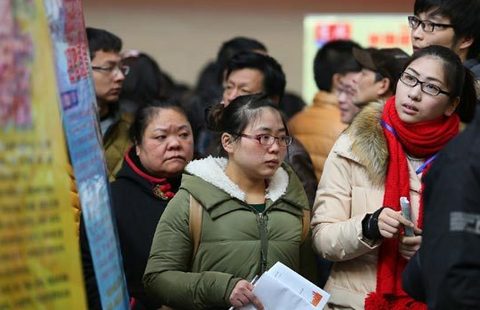Qualcomm fined $975 million in China
By Lan Lan and Gao Yuan (chinadaily.com.cn) Updated: 2015-02-10 08:14
 |
|
A visitor holds a new Samsung Galaxy Note 4 smartphone after its presentation at the Unpacked 2014 Episode 2 event ahead of the IFA Electronics show in Berlin, Sept 3, 2014. [Photo/Agencies] |
Qualcomm is expected by industry sources to agree to changes in how it charges royalties on cellphones sold in China. Qualcomm earned about half of its global revenue of $26.5 billion in China for the fiscal year ended Sept 28.
An agreement to lower royalty rates charged by Qualcomm on phones sold in China could affect its contractual relationships not just with local manufacturers such as Huawei, Lenovo, ZTE and Xiaomi Inc, but also with bigger global players that make and sell phones in China, such as Apple Inc and Samsung Electronics, said patent lawyers consulted by Reuters.
At a meeting with analysts in November, Qualcomm President Derek Aberle did not directly answer a question about when the chipmaker's largest licensees' contracts would be due for renegotiation, or how those renegotiations would be affected by potential concessions Qualcomm could make in China.
"If Qualcomm comes to an agreement with China's government to materially reduce its royalty rates, then what happens with their agreements with LG, Samsung and Apple?" said Ascendiant Capital analyst Cody Acree. "It becomes a snowball that's really hard to see the end to."
On the back foot
The China probe is the latest anti-trust investigation faced by Qualcomm, which was hit with a $20 million fine in South Korea in 2009 and was forced to renegotiate licensing agreements with Nokia and others by the European Commission in 2007.
"Qualcomm has more problems than just in China," said Donald Merino, who advises companies on patents in Asia. "They have a problem in the US as well because the US is devaluing the patent system."
China to form final ruling on Qualcomm case
China's top antitrust body will form a final ruling on mobile chip maker Qualcomm Inc as soon as possible, an official statement said on Dec 26.
Qualcomm was accused of price fixing and abusing its dominance in Chinese market. Probes into the case started in November 2013 in response to complaints from industry associations.
Xu Kunlin, head of the price supervision and anti-monopoly bureau of the National Development and Reform Commission (NDRC), said the case is being pushed forward in line with legal procedures, according to an online statement of the NDRC.
However, the commission did not mention a specific date for unveiling the ruling.
Qualcomm said it will continue to support the work of the NDRC, said the statement, noting Qualcomm President Derek Aberle had visited the NDRC several times to exchange views with the bureau.
- High royalties key reason behind Qualcomm fine: NDRC
- Beijing Capital Airlines to launch Kansai-Hangzhou flights
- China unlikely to weaken RMB: HSBC
- ZTE opens smart device factory in Xi'an
- China producer prices continue declines
- China January inflation cools to 0.8%
- UnionPay expand along the 'belt and road'
- Watch factory to pay more

















